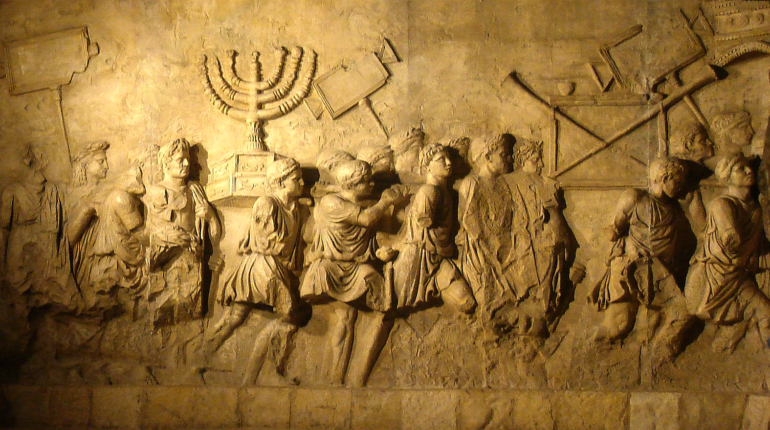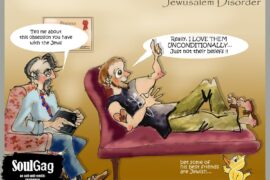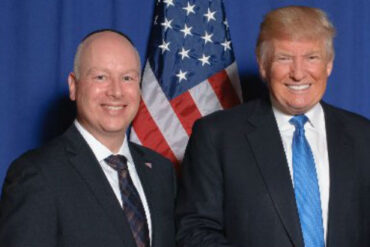In late 2015, I was part of the LAVI delegation to the World Zionist Congress that introduced and successfully fought to pass a resolution (by a slim 51% majority) declaring the Jewish people indigenous to the land of Israel.
This followed roughly a decade of us urging the pro-Israel community to not only understand that we Jews are indigenous to Eretz Yisrael but also to internalize that identity and its ramifications. Not as some utilitarian hasbara talking point or tactical argument for why Israelis are right and Palestinians wrong, but actually as a step towards decolonizing Jewish identity within the context of advancing our people’s broader liberation struggle.
More than merely promoting the fact that we share biological, linguistic, socio-cultural and archaeological bonds connecting us to our ancestors and homeland, we also viewed the internalization of an indigenous identity as a means for overcoming many of the deeper challenges confronting Israeli society and the broader Jewish world.
The reactions we initially received from the Israel advocacy community, which seemed strangely committed to presenting Israel as part of the West, were less than encouraging. The fact that so many Jews ultimately needed someone like Ryan Bellerose – a native Métis expressing support for Zionism on the basis of Jewish indigeneity – to eventually make it acceptable for them to self-identify as part of an indigenous people reveals the degree to which their identities are influenced by how they understand themselves to be perceived by others.
What’s worse, however, is that many of the Israel advocacy professionals who eventually came around to employing the indigeneity argument once Ryan came on the scene seem to have no concept of – or desire for – actual decolonization. It’s not clear how they expect their claims of indigeneity to be taken seriously when they display virtually no solidarity with other indigenous peoples, express no real desire for Israel to indigenize into the Semitic region and still see foreign values and cultural frameworks as superior to those of their ancestors.
In short, despite calling themselves “indigenous,” many Israel advocates still view Semitic civilizations through the Orientalist lens of the West.
Part of the challenge is that most Zionists tend to limit the definition of indigeneity to something static – like a tree. A specific tree can be indigenous to a particular place and only be able to grow properly and produce healthy fruits when rooted in that soil, terrain, climate, etc. This static definition is certainly true for the Jewish people, who are significantly more healthy when residing in our own land. Even our ability to receive prophecy for the most part requires us to be situated in Eretz Yisrael.
Jews do check the necessary anthropological boxes (biological, linguistic, socio-cultural, archaeological) to qualify as indigenous and it’s actually a helpful English word to describe our people’s relationship with a country we’ve defined as our soulmate for thousands of years. But this word should ideally be deployed in the service of deepening Jewish identity, indigenizing back into the region and standing in solidarity with other indigenous peoples.
Some Jews still opposed using this language of Jewish indigeneity based on the misguided claim that it conflicts with our Torah’s narrative ostensibly teaching us that our ancestors were in fact foreigners to Eretz Yisrael. But in addition to this claim not having much relevance to the question of Jewish indigeneity today, it is also largely based on a misunderstanding of the words of our sages.
It should be noted that the Ramban explains the journey of Avraham’s family to the land of Israel as a return to their own native country. According to the Ramban, Ur Kasdim had been a foreign land to which the Hebrew family had previously migrated.
On the verse “Avram passed through the land… the Canaanite was then in the land” (B’reishit 12:6), Rashi teaches that when Avraham arrived, the Canaanites had been attempting to conquer the country from Avraham’s ancestor Shem and his Hebrew descendants, but the Holy One desired to give the land to Avraham, in accordance with Noaḥ’s division in which the land of Israel fell to his son Shem (both the Talmudic and Midrashic literature identifies Malkitzedek — the king of Jerusalem in Avraham’s generation — with Shem).
In an attempt to explain the word “אז” (“then” or “at that time”) in the above verse, several Torah luminaries support Rashi’s assertion that the Canaanites were only in the land at the time when Avraham arrived, but not previously. The fact that our classic commentators even discuss this issues reveals that the concept of indigineity isn’t foreign to Israel’s authentic understanding our or own identity. In fact, when Yosef tells his cellmates in an Egyptian prison that he had been “stolen from the land of the Hebrews” (B’reishit 40:15), it’s clear that the “land of Canaan” had been known as the “land of the Hebrews” in ancient Egypt.
Where the concept of Jewish indigeneity actually does become problematic, however, is when it’s politicized by hasbarists in Israel’s conflict with the Palestinians. What most Israel advocates don’t seem to appreciate is the fact that most people who fight for the rights of indigenous peoples couldn’t care less about the static definition outlined above. Wearing the label “indigenous” doesn’t excuse injustices perpetrated against others (certainly not injustices of a colonial nature).
From the perspective of those showing up for indigenous peoples and issues, the point is to attain justice for a precolonial population whose way of life was disrupted by a colonialism that excludes them from the social formation established on their land. So from this perspective, a Cherokee person isn’t necessarily considered indigenous to parts of what the American settler population now calls Alabama, Tennessee, Georgia and North & South Carolina merely because he shares ancestry with the precolonial population, but primarily because he is part of a group that had a civilization in this territory before the colonizers arrived and because that group continues to be for the most part excluded from the colonial and state structures built by the settlers who destroyed their way of life.
So a few Cherokee families relocating to Germany, marrying between themselves for three generations and then returning to North America as US citizens could cause them to no longer be indigenous in any meaningful political sense (despite checking all the relevant anthropological boxes) because they now have the status and privileges that come with being part of the dominant settler population.
While Jews unquestionably fit the first static definition, this is largely irrelevant to any serious political conversation that focuses on indigenous issues. Anyone presenting Zionism as an indigenous liberation movement needs to take into consideration the current power dynamics and structures Israeli Jews and Palestinians live under, as well the fact that the major Zionist movements and leaders utilized many colonial tools and even collaborated with British imperialism to achieve their aims.
What the hasbara professionals waving the indigenous flag need to understand is that most people who care about and fight for indigenous issues define an indigenous people not simply as a group with its cultural genesis in a specific territory but rather as a precolonial population disenfranchised by colonialism.
It’s therefore unhelpful to accuse Palestinians of being “colonizers” in our country, especially given that colonialism has a very specific connotation from a materialist perspective that’s understood to be driven by capitalism (although one could argue that capitalism developed alongside colonialism and the Atlantic slave trade). So Arabs conquering and/or populating parts of the Middle East a few centuries ago doesn’t make their descendants living under Israeli rule a “colonial” presence. Colonialism doesn’t just mean conquest but a specific type of conquest. Colonialism is systemic, perpetrated by nations able and willing to dominate others, and it’s driven by very specific material objectives like the expansion of markets, exploitation of cheap labor, theft of natural resources, etc. (settler-colonialism – by contrast – is driven by the creation of a new society that excludes and aims to ultimately replace the population that previously existed in a given territory).
Because Palestinians for the most part define Palestinian identity as referring to the indigenous peoples of Palestine throughout time (including the Canaanites, Philistines, Hebrews and even descendants of foreign invaders who remained and eventually absorbed into the social and cultural landscape), accusing Palestinians – many of whose forbearers were anyway Jews – of colonization sounds not only ignorant but detached from reality.
Claiming to belong to a people that once occupied a specific territory in order to claim exclusive rights to that territory doesn’t work within the context of any serious indigenous rights discourse. Especially when those rights are claimed at the expense of another people already in that land. And especially when a system is set up that privileges the newcomers and excludes the population already in the land before those newcomers arrived – which is essentially what the Zionist movement (specifically Labor Zionism) appears to have done.
So Zionists suddenly speaking about how indigenous Jews are to this land understandably sounds ridiculous to those scholars and activists who define colonialism and indigeneity based less on who your ancestors were and more on what you do/what’s done to you.
All that being said, I actually do think we should see Jews as indigenous to the land of Israel – even according to the definitions of those standing in solidarity with indigenous peoples.
A deeper exploration of Jewish identity and history shows that Jews actually do fit the materialist definition. If we look at the Roman destruction of Judea as the colonial event and take into consideration the fact that the Jewish people, as we continued through history, essentially remained a refugee population focused on returning home and regaining independence until we ultimately succeeded at both, Jews certainly qualify as an indigenous people.
There was a vibrant and well-rooted Hebrew civilization in Judea that was destroyed by Roman invaders nearly 2,000 years ago. While some might claim that Roman colonialism wasn’t colonialist in the sense of how it’s currently understood because the Roman Empire predated the capitalist system, I’d argue that because many of the same material objectives were in place, it’s not difficult to understand Roman colonialism within the modern context.
For roughly 1,700 years following the Roman destruction, Jews lived as refugees scattered throughout the world. Yet nearly every ritual and holiday built into Jewish Diaspora life served as a nostalgic reminder of the homeland we continued to pine for. Practically every festival and major lifecycle event featured an expression of deep commitment to one day returning and rebuilding Jerusalem. On the days commemorating her destruction each year, Jews throughout the world would afflict ourselves by refraining from food and drink. There were even several liberation movements over the centuries that attempted to restore Jewish independence to Palestine.
The Jewish Diaspora experience in much of the world featured isolated ghetto communities separate from host nations, where we lived according to a portable version of the civilization we left behind and hoped to one day rebuild. But as time went on and the persecution we suffered in foreign lands increased, many aspects of our identity, culture, value system and worldview began to change. Sometimes this was due to direct persecution and external coercion and sometimes it was due to the internal desire to avoid persecution through erasing our differences with host nations.
The most drastic shift in Jewish identity came during the “Enlightenment” period, which saw Jewish leaders in Western Europe begin to redefine their Jewish identities from being part of a people in exile from its land to being Europeans with a “Jewish religion.”
All of the above should be understood as one long multilayered process of colonization. The Jews of Judea were the precolonial population. The Romans were the colonizers who conquered our land, exploiting our people and resources before destroying our civilization.
Our process of colonization continued deep into a nearly two thousand year exile in which our self-identification as refugees yearning to return home remained largely intact and unbroken in most of the world. Those of us in Europe, however, essentially lived under a civilization we continued to see as the natural outgrowth of Rome, where we suffered more traumatic persecutions and eventually altered our own identities in order to avoid further trauma.
The fact that we came back so colonized that we actually used colonialist methods and frameworks to attain our independence in the country we had been displaced from could be confusing at first glance. But this really only speaks to the uniqueness of our people’s experience. I can think of no other example of an ancient people being crushed and uprooted from its land, yet maintaining its collective identity and folkways in exile for two millennia until finally returning and restoring political independence to the homeland it had initially been displaced from.
When engaging in conversations surrounding this issue, I find it helpful to emphasize how unique Jews are in history, to acknowledge the complications of an ancient native people restoring its independence through colonial means and draw attention to the political/ideological legacy of Leḥi (Fighters for the Freedom of Israel), which consciously rejected Zionism and Zionist institutions (largely due to their colonial methods and collaboration with imperialism) and expressed solidarity/sought unity with the other native peoples of the Semitic region.
The long process of internal colonization we underwent in exile still impacts Jewish identity, influences our behavior towards Palestinians and fuels our conflict. In many ways, Palestinians should be seen as victims of the colonization and identity crises plaguing the Jewish people. The conflict between us might be unique in that both parties attempt to weaponize the notion of indigeneity against one another for propaganda purposes. But the truth is that liberation for both peoples is deeply intertwined and dependent upon each of us accepting the Other’s roots in this land.
Despite my many criticisms of the shallow hasbara-driven Jewish indigeneity discourse, I’m actually grateful to see more and more of my people at least recognizing their own indigeneity on a superficial level. It’s a step. But that identity must be internalized if we hope to advance our struggle, and that internalization must include genuine solidarity with other colonized peoples.






Did Jews living outside of Israel that did NOT reside in Europe also assimilate? For example; Jews in Morocco? Or Jews In Iraq? Or Ethiopia? It seems you are fixated with the notion of Jews can assimilate only in the West.
The other thing is it seems you and Ryan disagree on the indigenous status of Arabs in Israel. Is that correct?
Shavua tov Mickey. Yes, Ryan and I disagree on the indigenous status of Palestinians. I also think the word itself has limits we need to be sensitive to. In addition to being a term coined by colonizers to essentially describe their victims, it has fluid definitions that often depend on the political leanings of the user. Ryan’s definition might fit the Jewish experience perfectly and exclude Palestinians but one of the reasons for my piece was to point out that this is only preaching to the choir unless others concerned with indigenous issues and struggles accept this definition. I hope my piece succeeded in showing that Jews are indigenous to the land of our ancestors even according to the definitions of those engaged in indigenous struggles.
Regarding your first point, I admittedly focused my piece on the experiences of Ashkenazi Jews for a number of reasons:
1. Descending from the Second Temple period Judeans, Ashkenazim were among the Jews who actually experienced colonization by the Roman Empire.
2. Ashkenazim spent the exile in Europe, which is essentially the civilization our sages view as growing out of ancient Rome. So I argue that the process of colonization continued within the belly of the beast that had destroyed our civilization.
3. Because the persecution was far more severe and because Ashkenazim were exiled further away from our homeland (as oppose to Jews who remained in neighboring countries with very similar cultures and value systems), Ashkenazim experienced sharper changes in identity, culture, values and worldview. Jews in other parts of the world didn’t experience an “enlightenment” period and largely maintained the identities of our ancestors until ironically being forcibly westernized in the State of Israel by Ashkenazi political leaders (specifically Mapai) who had themselves been victims of identity colonization in Europe.
Thank you for your response. You did not address several key points. First, language does matter. Would it not be better to say Jews assimilated in other cultures rather than they were colonized?
During the Second Temple Period it was both Sephardi and Ashkenazi. Many Sephardi have assimilated into “eastern cultures” just as Many”Ashkenazi” have influenced into Western culture.
As far as persecution goes nothing like having a Dhimmi status right? Maintained our identity with relics such as the Hamsa and Arabic and Eastern thought?
You can say we have similar value systems with any culture but in the end does Hashame not call us out to be a separate Nation???? Could it be that you grew up in America and have some form of “White Guilt”?
I also wonder if you ever heard you friend disparage Halacha and if you do you still feel he is good ambassador for our people? Did you ever publicly challenge him on that or are pseudo social sciences more important than Torah and Halacha?
Look forward to your response.
No, Jews were in fact colonized. First by Greeks, regained freedom during the Maccabean Wars. Then by Romans, who needed the buffer province of “Syria-Palestina” in order to protect their Egyptian Granaries from the Parthians. Then, with one interlude of Autonomy in partnership with the Sassanids, the Roman colonization continued, with the added twist of the impacts of Christianity being made the State Religion of the Roman Empire. And yes, Jews were colonized. Then came the Arabs, their first major conquest? The Levant from the Romans. Between the Islamic Choice, and dhemmi codes, the conquest and colonization was on! From 638 CE until 1077 CE when the Arabs lost the rule of the south Levant to the Seljuq Turks. However, as Arabic replaced Aramaic across the Arab Caliphates, the Jews did not lose their language, albeit standard liturgical use was the standard, as happened in the west. But Jews in the East always knew they were a People, throughout the MENA, they never went through the Napoleonic Haskala.
Are you saying Jews in the West did not know they were a people? Like the Jews in the East who adopted other languages the same happened in the west. The Jews of the East adopted non Jewish symbols and customs just like the Jews of the West. A perfect example would be the Hamsa. Another example how many Jews from the East believe Allah is the same as Hashem.
I do not argue that Jews who lived outside of Israel did not adopt foreign customs but I think that should encompass all Jews. Avraham was called out to be separate from the “East” and leave his homeland.
“But that identity must be internalized if we hope to advance our struggle, and that internalization must include genuine solidarity with other colonized peoples.”
Is this a Torah principle or standard? In other words standing in solidarity with pagans? Muslims? Xtians? Tribes living on islands that are both uncivilized and even if they are cannablisitic?
The Torah says we are suppose to be seperate from the Nations not have solidarity with them.
Yehuda, Thank you for putting to words how I imagine many in the diaspora still feel. Respectfully , I have a critique but I think it is a small one. There are many that are less informed about the history and culture of Jewish people generally. I and I’m sure others would benefit from more citation to justify your argument. While I agree that Jewish people are indigenous I take issue with the suggestion that we used tools of colonization. The earliest participants in the endeavor that would become modern Israel bought land and did what they could under the local authority to carve out a place for themselves.
I would argue that at no point was Zionism a colonial endeavor but rather a yearning for safety and self determination. The idea of equating Zionism with colonialism is fundamentally about de-legitimizing Israel and de-indigenizing the Jewish people. I would argue that the very idea of equating Zionism with colonialism is a red herring.
Given the demographics of Israels population being a majority population of Jews from the Middle East and North Africa I find it hard to entertain the idea about colonization( we can ignore the obvious problem of the label Mizrachi but I won’t pretend its not there). I think by any definition refugees are not considered colonizers and given that the majority of all Jews in Israel are descended from refugees the world over, how can we then call them colonizers?
I appreciate your article thank you for making room for conversation that we and the world need to hear.
Indigenous? Weren’t the Canaanites and the Midianites there before Moses came from Egypt to massacre them and steal their land? Maybe it wasn’t such a great idea to write that bit down…
Great writing, subtle, informative i luv the image of “portacle”, and this idea of Indigeneity . Very subtle …thanks,,,